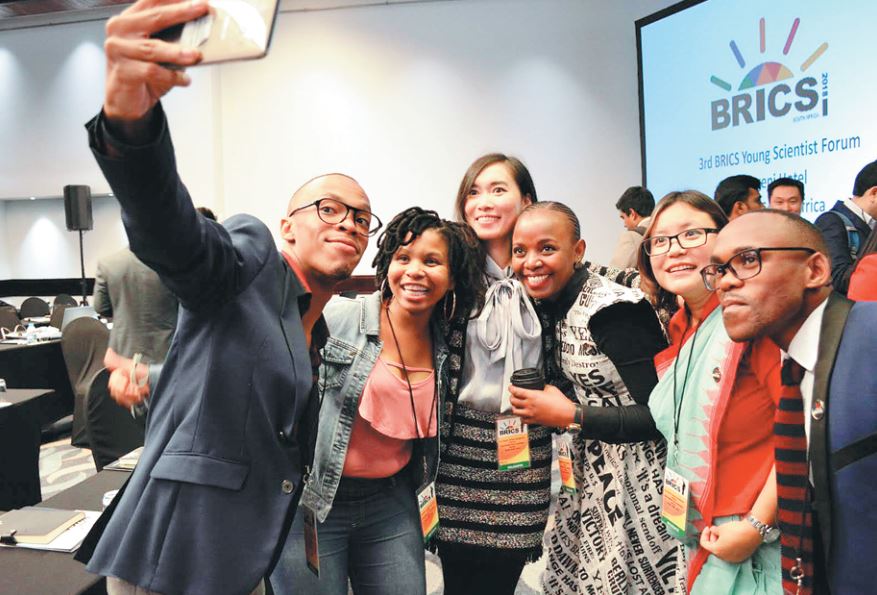Language bridges cultural divide
By Cao Desheng | China Daily | Updated: 2018-09-03 10:20

Chinese graduate gains insight studying in South Africa, Cao Desheng reports.
When Huang Lizhi took her first class in African sociology at the University of the Witwatersrand in South Africa in February, her professor, Raji Matshedisho, asked her and her classmates one question: When it comes to Africa, what impresses you the most?
Unexpectedly, Huang, 31, who came to the university to study Zulu - one of the most widely-spoken languages in Africa - found that words like "poverty", "disease" and "safari" that were often associated with the continent in media reports were precisely the kinds of terms her African classmates did not want to hear.
They instead preferred to answer the question in this way: "Africa is the cradle of humankind.
"Africans are passionate and generous.
"Africans have great forgiveness. We have suffered a lot, but benefit the world in return."
Huang said her African classmates didn't like the rigid concepts that other people imposed upon their countries as a whole, and instead, were full of pride when they talked about their nations.
Huang completed her doctorate in international relations from Peking University in 2015 and started working as an assistant to the professor for the School of Asian and African Studies at Beijing Foreign Studies University. Her area of research focused on African studies.
In 2017, she decided to study Zulu language at the University of the Witwatersrand in Johannesburg. She began attending classes at the university in January this year and aims to spend four years completing her bachelor's degree and master's programs like her African classmates, before returning to her university in Beijing to teach the African language.
Language serves as a bridge to cultural exchanges, Huang said. "Only if you have a good command of the other country's language can you have cultural exchange between different peoples in a real sense. Accordingly, a true people-to-people bond can be realized in turn."
Huang's university aims to expand its "language basket" from the current 98 languages to include all the languages of countries around the world that maintain diplomatic ties with China.
This was one of the reasons that she was sent to the University of the Witwatersrand to study Zulu, one of the official languages of South Africa and spoken by around 11 million people.
What's more, Huang said, as China has been expanding cooperation with the African country under the framework of the Belt and Road Initiative, there has been an increasing demand for people who are experts in the country's culture, and in particular the customs, habits and taboos of the indigenous people, who are often local communities involved in cooperative projects.
"I hope to play a part in promoting understanding between the Chinese and South African peoples," she said.
The "rainbow nation" has profoundly changed the preconceptions about Africa that she picked up from media reports about the continent. The convenient living conditions, the amazing natural beauty and the friendly people, all came as something of a pleasant surprise to her.
"What I see and what I hear make me feel that the previous impressions about Africa stem from what was preached by the Western colonists to help them justify their presence in Africa," Huang said.
In Huang's eyes, her classmates were as hopeful about the future of their own countries as they were for Africa as a whole, and they were quick to demonstrate both their strong will and initiative. "Their passions often overwhelmed me."
When Huang introduced herself in Zulu language in a keynote speech at the third BRICS Young Scientists Forum held in Durban in June, the audience treated her to a huge round of applause.
She said she had witnessed such long-lasting cheers and applause earlier at a commemoration ceremony for the late Winnie Madikizela-Mandela, the former wife of Nelson Mandela.
"At that moment, I knew exactly what they wanted - they wanted their culture to be respected. I came to understand the significance of what my studying Zulu meant to people," Huang added.
However, she was sometimes perplexed by some of the questions asked by her classmates about China. One typical question was: As more and more Chinese businesses and investors come to Africa, what is it that they bring to the continent?
"Behind this question lies a lack of understanding among ordinary Africans toward China. That's why it is important to enhance people-to-people contact and cultural exchanges," Huang said, adding that the discussion on Africa is to a large extent dominated by the Western media.
More efforts are still needed to help the African public understand more about China over and above intergovernmental communication, Huang said.
"Among other things, building people-to-people bonds through cultural exchanges will help showcase our sincerity and respect for Africa, and build a long-lasting image of China in Africa," she added.
























